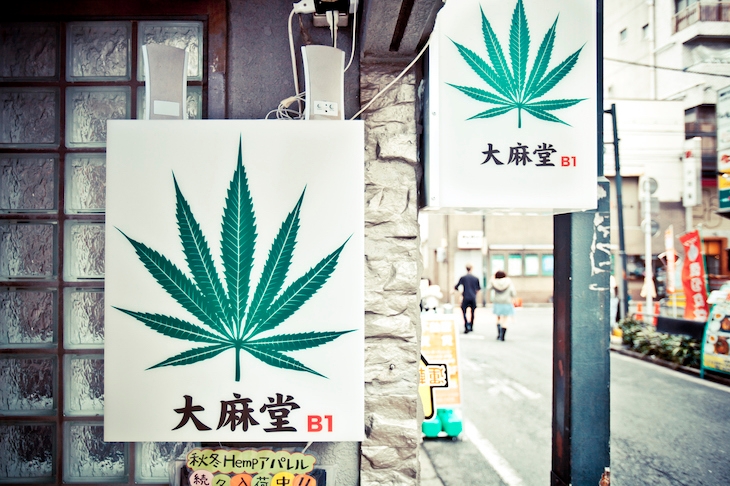Walking along Tottenham Court Road on a recent, rare, trip to London I was struck by a sweet, pungent odour, which I couldn’t immediately identify. The answer arrived moments later while cutting through a dark Dickensian alley en route to Oxford Street.
My way was blocked by a group of wild-eyed, ragged looking men, all smoking marijuana. It was like a scene from Michael Jackson’s Thriller video, except genuinely scary. The men were staring at me as if I were a trespasser. Concluding that proceeding with my shortcut was probably unwise; I turned on my heels and took the long way round.
The reason I had forgotten that distinctive aroma is simple: I’ve lived in Tokyo for the last 20 years. In all that time I don’t think I have ever smelt marijuana, even in my earlier more socially active days in the grungier parts of Roppongi or Shinjuku. And I have never felt afraid walking around the city. Not once.
Attitudes in the UK and Japan to drugs seem to come from different centuries. In Britain it seems we have accepted the smoking of cannabis, even openly in our town centres, as a fact of life. In Japan, drug use is minimal, and on a public street, unimaginable. In the UK there is a noisy and growing lobby calling for full legalisation of cannabis; in Japan it’s not an issue.
On the BBC’s The Big Questions recently journalist Peter Hitchens cited Japan and South Korea as two examples of countries where strict application of drug laws has resulted in the near eradication of usage. His comparison was airily dismissed by Fiona Godlee, editor in chief of the British Medical Journal, with the following: ‘South Korea and Japan have very culturally different histories to ours’.
I wonder how much Godlee knows about the cultural history of Japan, but she’s not entirely wrong. Japan has a deep relationship with cannabis cultivation going back to prehistoric times – very different indeed from the UK. It was employed for centuries in the manufacture of hemp, used for clothing, ropes, fishing lines and bowstrings. The leaves were also used as offerings in Shinto ceremonies. There were, until the 1950s, at least 25,000 cannabis farms in Japan.
But perhaps Godlee meant that the Japanese are ‘culturally’ less tolerant of illicit or harmful substances. In this she is most certainly wrong. Apart from cannabis, which almost certainly used to be smoked widely, there was an amphetamine abuse problem of epidemic proportions in post-war Japan, and Mad Men levels of drinking and smoking persist in the corporate world today.
The primary reason for the scarcity of cannabis users in Japan is that scarily strict laws, introduced by the US with the 1948 Cannabis Control Act, are stringently applied and sentencing is harsh and consistent. While in the UK you are highly unlikely, as the gentlemen in the alley surely realised, to face any sanction for brazenly defying the law, in Japan you will be punished severely even for the possession of small amounts of weed: six months if you’re lucky, five years if you’re not.
Not only that, but the stigma attached to a drugs conviction means that you have little chance of rebuilding your life afterwards. And that applies to everyone: the actor Ryo Hashizume is one of a number of celebrities whose careers have been derailed by drugs; after he was arrested for possession in 2017 his new film was shown with his scenes deleted, a la Kevin Spacey. Japan is as unforgiving of drug takers as we are of sex offenders.
Underpinning this approach is a fundamental difference in attitude to crime. The Japanese still see criminality as a question of individual morality, not the result of disadvantaged circumstances. Society is emphatically not to blame. This is especially true of drugs, and is revealed in the language used to describe ex-offenders: kosei (‘corrected’, after receiving strict punishment), rather than kaifuku (‘recovered’, as if from an illness).
This may seem harsh, unsophisticated, or even backward, but it is also very effective. The vast majority of young people grow up with no experience or knowledge of drugs, their faculties remain intact, and their families, friends and neighbours live unaffected by the consequences of drug abusers in their midst. And people can walk the streets without fear – any street, at any time.
Meanwhile in the UK not only have we stopped noticing the reek of marijuana on our streets, we are becoming increasingly inured to the heartbreaking stories of random violence committed by wild-eyed, ragged, marijuana addled psychotics on wholly innocent bystanders. See Peter Hitchens’ blog for innumerable examples.
I ended my London walk that day at Foyles and couldn’t help noticing the number of Japanese lifestyle books on display, Marie Kondo, inevitably, prominent among them. We seem to have an insatiable appetite for Japanese wisdom, whether it is de-cluttering, forest bathing, origami, or even bonsai. But there is a lot more to be learned from Japan than how to fold T-shirts or prune rose bushes, especially when it comes to our own attitude to drugs laws.







Comments